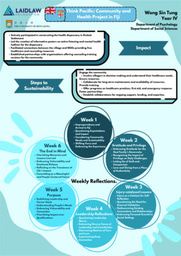LiA Project Outline
Leadership-in-Action Project Outline
Full Name and Affliliated University
Full name: Wong Sin Tung
University: The University of Hong Kong
University Contact:
Full name: Audrey Chung
Department: Horizons Office
Email Address: audrey.chung@hku.hk
Title of LiA Project:
Community and Health Project
Organization Partner:
Think Pacific
Organization Contact:
Full Name: Simon Darker
Email Address: simon@thinkpacfic.com
Need or Cause Supported:
The Build Project by Think Pacific aims to construct infrastructure for rural Fijian communities, train local youths in carpentry, and fund community development initiatives. The Mental Health component focuses on promoting positive mental health through advocacy workshops, healthy habits, peer support, care strategies, physical activity, and leadership. The Diabetes Fiji’s NCD screening and advocacy program raises awareness about NCD prevention, treatment, and care, provides data to the Ministry of Health, and supports individuals with pre-diabetes or diabetes in host communities. These projects align with Fiji's National Development Plan and contribute to the overall well-being of rural Fijian communities.
Sustaining the Fijian Culture through education, supporting mental health, raising awareness for Diabetes, contribute to the construction of infrastructure for rural Fijian communities through several different community projects.
Goal:
- Promote population health and reduce premature morbidity and mortality due to diabetes through a holistic society approach to wellness and well-being
- Decrease youth suicides to 0%
- Through the build project, to help the government in working towards the goal of creating ‘healthy communities living in healthy environments and boost hard and soft skills in the youth
- To support culture and heritage preservation, which fuels Fijian economy through tourism
Objectives:
- Construct essential infrastructure for rural Fijian communities.
- Train and upskill local youths in carpentry and leadership.
- Promote positive mental health through workshops, healthy habits, and peer support.
- Raise awareness and support for NCD prevention, treatment, and care.
- Support and sustaining cultural exchange
Challenges, Barriers, or Risks to achieving objectives:
Some modifiable challenges to achieving objectives include,
- Cultural differences: Navigating cultural differences and ensuring that the project aligns with local customs and traditions may pose challenges. It is essential to respect and understand the conservative Fijian environment to avoid misunderstandings or conflicts.
- Communication barriers: Communication challenges may arise due to language barriers between project participants and local community members. This could hinder the effectiveness of training, workshops, and advocacy efforts.
- Resistance to change: Some community members may be resistant to change or new ideas, particularly in conservative environments. This could impact the adoption of new health practices, mental health discussions, and the acceptance of new infrastructure.
Ideas to Overcome Barriers and Challenges:
- Open communication and feedback: Establish open lines of communication and encourage feedback from community members. This will help identify any concerns or misunderstandings and address them promptly.
- Adapt project activities to local context: Tailor project activities to the local context, taking into account cultural norms and practices. This will ensure that the project is culturally appropriate and more likely to be accepted by the community.
- Build trust and relationships: Invest time in building trust and relationships with community members. This will help overcome communication barriers, resistance to change, and cultural differences, as well as create a supportive environment for the project's success.
- Cultural sensitivity training: Provide cultural sensitivity training for project participants to help them understand and respect local customs, traditions, and values. This will foster better communication and collaboration with the community members.
- Gradual introduction of new ideas: Introduce new ideas and practices gradually, allowing community members time to adapt and become comfortable with the changes. This approach can help minimize resistance and promote acceptance of new concepts.
- Cultural exchange and learning: Encourage cultural exchange between project participants and community members by organizing events, workshops, or activities that showcase each other's customs and traditions. This will foster mutual understanding and appreciation of cultural differences.
Milestones per week:
While the project community partner has not set up milestones for participants yet, but here are a series of personal milestones:
Week 1:
- Attend cultural sensitivity training and learn basic phrases in the local language.
- Settle into the village and get to know the host family.
- Attend project orientation and understand the project objectives and activities.
- Set project goals with fellow teammates and community partner representatives to ensure better communication and expectations of what can be achieved during the 6-weeks
Week 2:
- Start participating in project activities, such as construction, workshops, or health promotion.
- Reflect on personal growth and adaptation to the village lifestyle.
- Stay proactive in taking on responsibilities around the household if possible, or within community projects.
- Continue building relationships with community members and local stakeholders.
Week 3:
- Evaluate personal progress in overcoming communication barriers and cultural differences.
- Contribute to a project’s ongoing success by gaining a deeper understanding of the projects impacts on the community and its long-term goals
- Strengthen relationships with community members and project participants.
Week 4:
- Reflect on personal growth and the skills acquired throughout the project.
- Share experiences and lessons learned with fellow project participants and community members.
- Assist in the completion of project activities and ensure a smooth handover to local stakeholders.
Week 5:
- Take on a leadership role within the project, mentoring new participants or overseeing a specific aspect of the project.
- Engage in more advanced cultural learning, such as learning about local history
- Collaborate with community members to identify and address any emerging challenges or opportunities.
- Continue to develop personal skills and adapt to the village lifestyle.
Week 6:
- Reflect on the overall project experience and personal growth, identifying key takeaways and lessons learned.
- Participate in a closing ceremony or event to celebrate the project's achievements and express gratitude to the community.
- Say farewell to the host family and community members, expressing gratitude for the shared experiences and lasting connections.

Please sign in
If you are a registered user on Laidlaw Scholars Network, please sign in